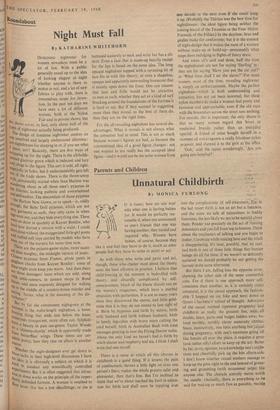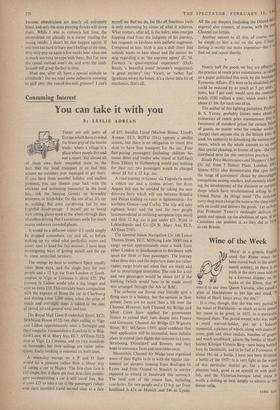Parents and Children
Unnatural Childbirth.
y MONICA
FURLONG
IT is funny how no one ever asks what one is having babies for. It would be perfectly rea- sonable if, when one announced to one's friends that one was having another, they turned and inquired why. Women have babies, of-course, because they like it and feel they have to do it, much as other people feel they have to write or paint or act.
As with those 'who write and paint and act, though, those who chatter most about the theory seem the least effective in practice.) believe that child-bearing at the moment is bedevilled with theory, and absurdly complicated by self- consciousness. Much of the blame should rest on the women's magazines, which have a morbid obsession with parturition. It is not so many years since they discovered the uterus, and little gold- mine that it is they do not intend to lose sight of it. Birth by hypnosis and birth by nature, birth with husband and birth without husband, birth in lonely log-cabin with brave mum cutting the cord herself, birth in Australian Bush with kind messages pouring in over the Flying Doctor radio. About the only kind we haven't had is birth by witch-doctor and raspberry leaf tea. I think I shall write that one myself.
There is a sense in which all this interest in childbirth is a good thing. If it lessens the pain of confinement, throws a little light on even one person's fears, makes the whole process safer and pleasanter, then that's fine. But I'm inclined to think that we've about reached the limit in educa- tion for birth and shall soon be toppling over into the complications of self-awarenessi, Fuji in the last resort birth is not an art but a function. and the more we talk of naturalness in 'boUily functions, the less likely we are to be natural ahout them. Ponder too precisely on the act of running downstairs and you fall from top to bottom. Think about the mechanics of talking and you begin to stutter. Cerebrate while making love and the result is disappointing. It's time, possibly, that. we real- ised birth is one of those little things that human beings do all the time; if we weren't so delicately nurtured we should probably be out getting the harvest in the same afternoon.
But there I am, falling into the opposite error. showing the other side of the same counterfeit coin. For if there is one approach more ' self- conscious than another, as it is certainly more unnatural, it is the casual approach, the fashion- able 'I hopped on my bike and went down to Queen Charlotte's' school of thought. Advocates of the casual method represent pregnancy and childbirth as really the greatest fun, with h all doubts, fears, pains and bulges hidden away .be- hind terribly, terribly clever maternity cliithes. Since, instinctively, one feels anything but 'Fii'sual during pregnancy, with one's emotions going off like bombs all over the place, it requires a great (and rather silly) effort to keep up the act. Better by far, in my opinion, to acknowledge one's explo- sions and cheerfully pick up the bits afterwards. I don't know whether casual mothers manage to keep up the pose right to the end instead of groan- ing and grumbling (with occasional yelps) like anyone else. The charade scarcely seems worth the candle. (Actually, there is. everything, to be said for making as much fuss as possible, mainly because obstetricians are nearly all extremely blase', and only the most piercing shrieks will move them. While 1 was in extremis last time, the obstetrician sat placidly in a corner reading the racing results. I shan't let that happen again). If one tries too hard to bury one's feelings at the time, they only pop up again a few weeks later when one is much too busy to cope with them. But I'm sure the casual method won't do, and even the intel- lectuals will grasp the fact in time.
Must one, after all, have a special attitude to childbirth? Do we need some defensive covering to pull over this run-of-the-mill process? I can't myself see that we do, for like all functions birth is only interesting by virtue of what it achieves. What matters, after all, is the baby, who emerges hopping mad from the indignity of his journey, but responds to kindness with pathetic eagerness. Compared to him, birth is just a dull chore that nobody wants to hear about and the sooner we stop regarding it as 'the supreme agony' (E. M. Forster), 'a quasi-mystical experience' (Dick- Read), 'a beautiful event' (women's magazines), 'a great mystery' (my Vicar), or 'rather fun' (graduate wives) the better. It's a clever little bit of mechanics, that's all.







































 Previous page
Previous page